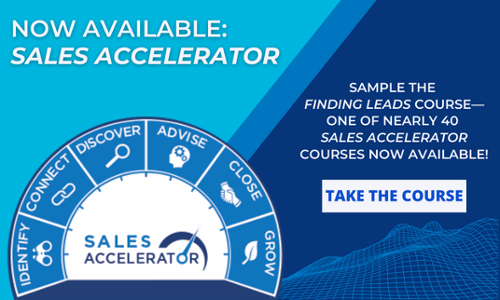
To pick someone up has been used as slang, according to Dictionary.com, since at least the 1600s.
Today's pick-up line means a rehearsed remark to strike up a conversation with the goal of pursuing a more gratifying relationship later.
Many salespeople have a rehearsed line meant to initiate a relationship with a prospect to satisfy their need to make another sale. Even when you’ve tried to find a Valid Business Reason (VBR), you might still end up sounding like you’re using a pick-up line.
How can you tell if your VBR has value to the prospect?
Are You Relevant?
A good VBR should be looking for more than just a link to the prospect. “Let’s hook up; I have something you need” is not enough.
You need to make it relevant and meaningful for the prospect. Your product in-and-of-itself is not meaningful to your prospect, but your capabilities can be part of your valid business reason to connect and meet.
At its best, your VBR will tie together current trends, your capabilities, and business opportunities.
Are You Bringing Insights?
Wikipedia says novices are advised to avoid standardized pick up lines, particularly those resembling country songs.
Your opening line should ideally be based on more than a script. Research about a prospect’s business or industry is much better. Show that you’ve taken the time to learn what is affecting them. It demonstrates empathy for their situation. It positions you as having some business acumen and expertise.
However, research alone is not an insight if you are simply telling the prospect what they already know. Research is a good first step; you just need to take the next steps.
Are You Providing New Information?
You don’t want to simply tell the prospect something they already know from reading their own trades.
An insight should help them come to new conclusions. This is where your problem-solving capabilities come in handy. Combine your research with how your capabilities have helped others at similar companies, or with similar challenges or opportunities.
Prospects love a good success story they can relate to themselves. They want to have someone who is bringing them new insights.
A Few Good Tests
The first test covers our traditional criteria. How much you need to develop each one of these is relative to the situation. Sometimes just one will be enough, but for bigger and better prospects, two or all three may be needed.
- Empathy - Are you demonstrating you understand the situation the prospect is facing? Are you able to show that you see it from their point of view?
- Expertise – Can you work with them as a professional peer? This doesn’t mean you’re an expert in their industry, but that you have some expertise in using your products and services to address their situation.
- Problem-Solving – This is best built upon a foundation of empathy and expertise. You can help solve their challenges or leverage opportunities. The end goal is to achieve their desired business results.
Finally, ask yourself, does my VBR sound like a pick-up line?
- Does it sound canned, over-rehearsed, or a bit too clever?
- Does it just tell the prospect what they already know?
- Does it have relevance or value to the prospect or only for yourself?
- Is it based on a country song?
What do you think makes a good valid business reason and how will you make sure you don’t sound like you’re just trying to pick-up the prospect for what you want?



